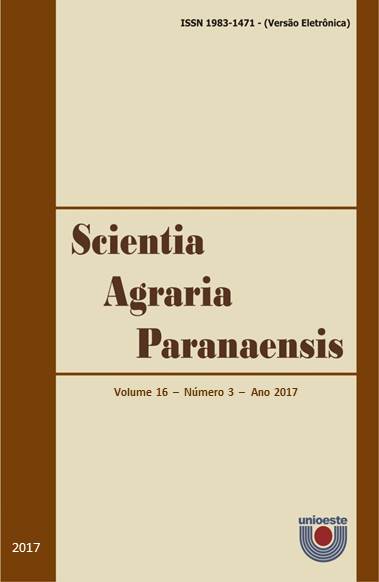Non-starch polysaccharides on nutrient digestibility of diets for different production stages of pigs
Palavras-chave:
alternative food, fiber, intestinal health, metabolism.Resumo
The corn and soybean are the major constituents in pigs diets, however, there is a constant search for non-starch polysaccharides (NSPs) food sources to feed pigs at different production stages. This review objective is to provide grants to improve the NSPs knowledge, in relation to their influence on the nutrients digestibility and availability in diets for pigs in different production stages. NSPs are macromolecules simple sugar polymers (monosaccharides) resistant to enzymatic hydrolysis in pigs’ gastrointestinal tract due to the connections type between the existing units of low molecular weight carbohydrates, but subject to hydrolysis in the large intestine through microbial fermentation. Its inclusion in pig nutrition have shown positive effects on productivity, by reducing costs, by acting positively on physiology to improve enzyme secretion and digestibility in the initial phase, by acting as an energy source in the growth phase, the positive effects on carcass quality or to control possible problems associated with excessive food intake and stress arising from confinement in the reproductive stages. When soluble NSPs are highly fermentable they may increase the digesta viscosity forming a gel, affecting gastric emptying, increasing the chyme viscosity, leading to particles reduction in the diffusion rate and reducing the digesta enzyme-substrate contact. The studies with ingredients containing NSPs inclusion to feed pigs showed significant advances in identifying the sources and the many roles in the animal body at different production stages. However, there is a huge variation in the composition of NSPs in the various sources, and the experiments carried out in most cases are not conclusive. Thus, further research with the NSPs use, both soluble and insoluble, will be important, therefore, may potentiate the various sources use in pig diets without acting negatively.
Downloads
Publicado
Como Citar
Edição
Seção
Licença
Aviso de Direito Autoral Creative Commons
Política para Periódicos de Acesso Livre
Autores que publicam nesta revista concordam com os seguintes termos:
1. Autores mantém os direitos autorais e concedem à revista o direito de primeira publicação, com o trabalho simultaneamente licenciado sob a Licença Creative Commons Attribution que permite o compartilhamento do trabalho com reconhecimento da autoria e publicação inicial nesta revista.2. Autores têm autorização para assumir contratos adicionais separadamente, para distribuição não-exclusiva da versão do trabalho publicada nesta revista (ex.: publicar em repositório institucional ou como capítulo de livro), com reconhecimento de autoria e publicação inicial nesta revista.
3. Autores têm permissão e são estimulados a publicar e distribuir seu trabalho online (ex.: em repositórios institucionais ou na sua página pessoal) a qualquer ponto antes ou durante o processo editorial, já que isso pode gerar alterações produtivas, bem como aumentar o impacto e a citação do trabalho publicado (Veja O Efeito do Acesso Livre).
Licença Creative Commons
Esta obra está licenciada com uma Licença Creative Commons Atribuição-NãoComercial-CompartilhaIgual 4.0 Internacional, o que permite compartilhar, copiar, distribuir, exibir, reproduzir, a totalidade ou partes desde que não tenha objetivo comercial e sejam citados os autores e a fonte.


